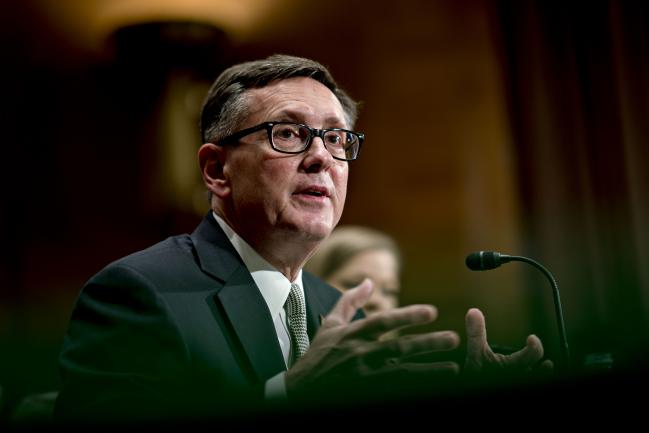(Bloomberg) -- The Federal Reserve’s newly installed No. 2 official backed the U.S. central bank’s plans for some further gradual interest-rate increases and suggested policy makers won’t change course in response to political pressure or recent stock market jitters.
With the Fed “as near as it has been in a decade” to its goals of full employment and price stability, and monetary policy still bolstering the economy, “I believe some further gradual adjustment in the policy rate range will likely be appropriate,” Vice Chairman Richard Clarida said Thursday in a speech at the Peterson Institute for International Economics.
Asked whether President Donald Trump’s criticism of the Fed’s tightening will sway policy decisions, Clarida said “it will in no way be a consideration as far as I’m concerned. We have a very clear mandate” and “our job is to sustain what is a very healthy and robust economy.”
Clarida also downplayed the potential impact of recent stock market turbulence on Fed policy, noting that the fundamentals of the economy are “very, very solid.”
Global Stocks
While acknowledging that financial market movements can influence the economy, Clarida said they needed to be sustained and were just one of a wide range of factors to take into account in assessing the outlook. Global stocks may be headed for their worst month in more than six years, buffeted by concerns ranging from heightened trade tensions between the U.S. and China to rising interest rates by the Fed. A surge in tech shares pushed up U.S. benchmark indexes on Thursday.
The Fed’s job in trying to prevent an overheating economy while not hitting the brakes too firmly is being complicated by a rising public pressure from Trump to slow the pace of rate increases. Trump has criticized the Fed at least seven times since July. In his most recent comments on the central bank, on Oct. 23, he told The Wall Street Journal that “maybe” he regretted nominating Jerome Powell to be Fed chairman.
In his debut speech as a Fed official, Clarida said that in contrast to earlier periods of the expansion, “the risks that monetary policy must balance are now more symmetric and less skewed to the downside.”
Policy Prescription
He made clear that his policy prescription into 2019 would hinge around inflation.
“If strong growth and employment gains were to continue and be accompanied by stable inflation, inflation expectations, and expectations for Fed policy, that situation, to me, would argue against raising short-term interest rates by more than I currently expect,” said Clarida, without specifying his precise projection for rates.
Clarida expressed some optimism over the outlook for productivity, a key component in growth that has disappointed over several years. He pointed, in particular, to rising business investment as a source of encouragement.
He also saw “scope for the job market to strengthen further without generating inflationary pressures,” noting that prime-age labor force participation remains low.
Neutral Level
While agreeing with Powell’s view that the concept of a neutral level for interest rates provides limited guidance to policy makers because of its imprecision, Clarida nevertheless said it remained a “relevant consideration” for him in judging the stance of monetary policy. And he saw some signs from the U.S. bond market that it may have increased recently, perhaps to around 0.75 percent in inflation-adjusted terms.
The U.S. economy is poised to record its best back-to-back quarters of growth since 2014 when third-quarter data is released Friday. Economists surveyed by Bloomberg expect a 3.3 percent annualized pace of expansion in the July-September period after a 4.2 percent gain in the prior quarter. Inflation, meanwhile, hovered near the Fed’s 2 percent target even as unemployment in September dipped to 3.7 percent, a 49-year low.
The Fed has already raised rates three times this year, and against that bright background, officials have penciled in one more hike this year and three for 2019.
Before joining the Fed in September, Clarida, 61, was a professor at Columbia University and a global strategic adviser at the Pacific Investment Management Co. He also served in the U.S. Treasury Department under President George W. Bush.
A graduate of Harvard University in 1983 with a Ph.D. in economics, Clarida has concentrated his academic research on monetary policy, currency exchange rates and international capital flows. He is perhaps best know for his work on computer models that seek to predict how the economy will react to shocks and changes in policy, and which are widely used by the Fed and other central banks.
